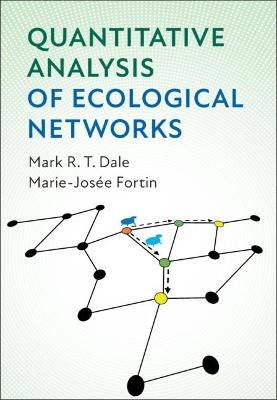
Quantitative Analysis of Ecological Networks
Cambridge University Press (Verlag)
978-1-108-49184-6 (ISBN)
Network thinking and network analysis are rapidly expanding features of ecological research. Network analysis of ecological systems include representations and modelling of the interactions in an ecosystem, in which species or factors are joined by pairwise connections. This book provides an overview of ecological network analysis including generating processes, the relationship between structure and dynamic function, and statistics and models for these networks. Starting with a general introduction to the composition of networks and their characteristics, it includes details on such topics as measures of network complexity, applications of spectral graph theory, how best to include indirect species interactions, and multilayer, multiplex and multilevel networks. Graduate students and researchers who want to develop and understand ecological networks in their research will find this volume inspiring and helpful. Detailed guidance to those already working in network ecology but looking for advice is also included.
Mark R. T. Dale is a Professor in Environmental Science at the University of Northern British Columbia. His research interests include the spatial structure of plant communities and the development and evaluation of numerical methods to answer ecological questions, including graph theory and network complexity. His graduate students have worked in a diverse set of systems from prairie to alpine and at a range of spatial scales from plant neighbour competition to landscape disturbance patterns. He wrote Spatial Pattern Analysis in Plant Ecology (Cambridge 1999), and Applying Graph Theory in Ecological Research (Cambridge 2017) and was co-author, with Marie-Josée Fortin, of Spatial Analysis: A Guide for Ecologists (Cambridge 2005, 2nd ed. 2014). Marie-Josée Fortin is a University Professor in Ecology and Evolutionary Biology at the University of Toronto. She is a Fellow of the Royal Society of Canada and holds a Tier 1 Canada Research Chair in Spatial Ecology. Her research endeavors focus on conservation biology issues. She investigates how ecological processes and environmental factors affect species persistence, species dispersal, and species range dynamics. Her research is at the interface of several disciplines (spatial ecology, conservation, forest ecology, disturbance ecology, community ecology, landscape genetics, spatial epidemiology, spatial statistics, spatially explicit modeling, and network theory) where the most important challenging problems lie.
Preface; 1. Ecological Processes and Network Systems; 2. Structural Properties of Networks; 3. Quantitative Analysis of Dynamic Networks; 4. Multi-layer, -type, and -level Networks; 5. Tying it all together: Summary and Synthesis.
| Erscheinungsdatum | 16.04.2021 |
|---|---|
| Zusatzinfo | Worked examples or Exercises |
| Verlagsort | Cambridge |
| Sprache | englisch |
| Maße | 177 x 251 mm |
| Gewicht | 630 g |
| Themenwelt | Naturwissenschaften ► Biologie ► Botanik |
| Naturwissenschaften ► Biologie ► Ökologie / Naturschutz | |
| Naturwissenschaften ► Biologie ► Zoologie | |
| ISBN-10 | 1-108-49184-7 / 1108491847 |
| ISBN-13 | 978-1-108-49184-6 / 9781108491846 |
| Zustand | Neuware |
| Informationen gemäß Produktsicherheitsverordnung (GPSR) | |
| Haben Sie eine Frage zum Produkt? |
aus dem Bereich


